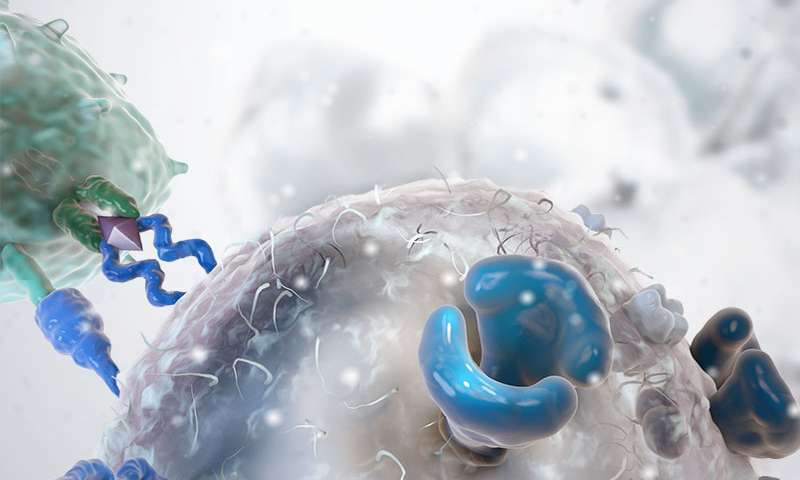When Jonathan Epstein first looked through the microscope to examine the results of a study using CAR T cells in mice, he didn’t know whether the sample came from a treated animal or a control. But right away, “it was just so clear,” he says. All the mice had started out with cardiac fibrosis, a stiffening of the heart tissue, and the engineered immune cells were designed to target and kill fibroblasts causing the dysfunction. What he observed in some samples was that the fibrosis was quickly disappearing—a clear sign the treatment was working. “[We did] a high-five over the microscope.”
Epstein and his team describe their results in Nature today (September 11), the first proof-of-concept of applying the cancer immunotherapy to cardiac fibrosis, for which there are no other therapeutic options.
“The idea that cardiovascular disease, the first cause of death in the US and worldwide, could be cured instructing T cells to kill detrimental cells is revolutionary,” Chiara Giannarelli, a cardiologist at Mount Sinai who was not involved in the study, tells The Scientist. “But we need more research before translating this experimental approach to patients.”
Cardiac fibrosis is a stiffening of the heart tissue, caused by the proliferation of excess cardiac fibroblasts. This type of scarring, characteristic of most cardiac diseases, leads to a loss of heart function and sometimes heart failure, which causes 800,000 deaths per year. “There really are no other therapies for a stiff heart, . . . and there’s enormous medical burden,” says Epstein, a molecular cardiologist at the University of Pennsylvania and the senior author of the study.
Chimeric antigen receptor (CAR) T cell therapy is a new approach to treating cancer. Researchers remove a patient’s T cells—immune cells that usually kill infectious cells—and engineer them to present special receptors that can recognize complementary antigens on cancer cells. Then, they infuse the T cells back into the patient’s body to track down and kill tumor cells. Since 2017, it’s been approved for certain types of leukemia and lymphoma, with many clinical trials ongoing for other forms of cancer.
The idea that T cells might be able to treat fibrosis as well came from a student (now a postdoc) in Epstein’s group. Haig Aghajanian, who is the first author of the study, figured that if these cells could be engineered to kill certain cancer cells, maybe they could be engineered to attack cells that cause hearts to stiffen and lose function. “If we could deplete the fibroblasts in the stiff heart, maybe it would allow a stiff heart to pump better,” says Epstein.
First, they sequenced RNA from 238 samples of the left ventricles of human heart transplant donors and recipients, to check for transcripts that might be expressed in damaged hearts but not in healthy ones. They found several, the most promising of which codes for fibroblast activation protein (FAP). FAP is a well-studied protein that has also been considered a target for some cancer therapies.
Next, the team infused mice with angiotensin II and phenylephrine, a combination that causes fibrosis, for 28 days. One week later, and then again at two weeks, they treated seven of the mice with CAR T cells engineered to recognize FAP. After four weeks, the treated mice showed significantly less fibrosis than the untreated mice. At eight weeks, five of the seven treated mice had almost no fibrosis left at all. The untreated mice still had widespread fibrosis.
The hearts of mice that had been treated also recovered some of their systolic and diastolic function.
Despite his enthusiasm, Epstein cautions that there’s still a long way to go. “We’re well aware of the significant amount of work that will still be required to prove that this could be useful to people,” he says. But the team does have one advantage: a CAR T cell therapy designed to attack FAP has already been developed and tested for safety in some humans to treat cancer. That’ll help the treatment move through tests for safety quickly.
The study is the “first to demonstrate efficacy of Car T-cell therapy in a pre-clinical model of cardiac fibrosis and dysfunction,” says Timothy McKinsey, the director of the Consortium for Fibrosis Research & Translation at the University of Colorado Anschutz Medical Campus, in an email. “Most of us are focused on developing anti-fibrotic small molecule drugs, but adoptive cell therapy could be a game-changer.”







